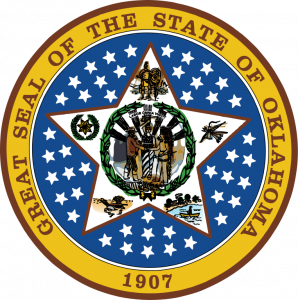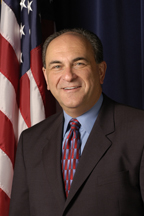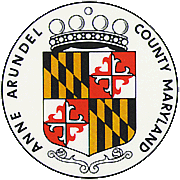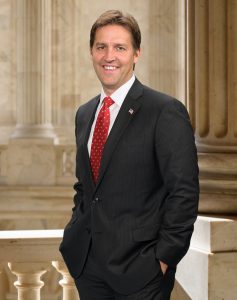July 11, 2024 •
Florida Increases Fines for Revolving Door Violations

Florida State Flag
The civil penalty for violating revolving door restrictions has increased. Senate Bill 7014 doubled the maximum fine to $20,000 for former officials who violate the state’s six-year ban on lobbying on matters of policy and procurement. The bill also makes […]
The civil penalty for violating revolving door restrictions has increased.
Senate Bill 7014 doubled the maximum fine to $20,000 for former officials who violate the state’s six-year ban on lobbying on matters of policy and procurement.
The bill also makes changes to ethics investigation procedures and to public disclosures allowing public officials who are lawyers to claim clients as a source of income without divulging their names.
February 12, 2020 •
Pennsylvania Lawmaker Introduces Bill to Stop Revolving Door
On February 3, State Representative Melissa Shusterman introduced a bill amending the revolving door provision. The bill requires public officials to wait one year after their term of office before lobbying. House Bill 2263 establishes a lifetime ban for public […]
On February 3, State Representative Melissa Shusterman introduced a bill amending the revolving door provision.
The bill requires public officials to wait one year after their term of office before lobbying.
House Bill 2263 establishes a lifetime ban for public officials from lobbying the governmental body they were associated with.
The bill also increases the waiting period for former public employees from one to two years.
If passed, this act takes effect in 60 days after enactment.
January 28, 2020 •
Washington Bill Aims to End Appearance of Lobbying Impropriety
Washington lawmakers have reintroduced a bill to impose a two year cooling off period to slow a revolving door of state officials and employees becoming lobbyists when they leave state employment. House Bill 1067 is intended to reduce the perception […]
Washington lawmakers have reintroduced a bill to impose a two year cooling off period to slow a revolving door of state officials and employees becoming lobbyists when they leave state employment.
House Bill 1067 is intended to reduce the perception of lobbyist impropriety.
The House Committee on State Government and Tribal Relations passed the bill out of committee.
The bill needs to pass the Rules Committee before getting a vote of the full House.
The State Government and Tribal Relations Committee passed the legislation during the last session, but the bill stalled.
The legislation would apply to state officers and employees who are employed by the state on or after July 1, 2021.
A companion bill, Senate Bill 5033, is moving through the Senate and passed to the Rules Committee.
May 30, 2019 •
Kansas Lawmakers Affirm Court Nominee and Adjourn Sine Die
The Kansas Legislature adjourned sine die on May 29. Lawmakers adjourned earlier in the month to allow the governor time to appoint a candidate to the Kansas Court of Appeals. On Wednesday, the Senate approved Sarah Warner to fill the […]
The Kansas Legislature adjourned sine die on May 29.
Lawmakers adjourned earlier in the month to allow the governor time to appoint a candidate to the Kansas Court of Appeals.
On Wednesday, the Senate approved Sarah Warner to fill the vacant seat.
During the 59-day legislative session lawmakers introduced House Bill 2010 and Senate Bill 51.
The bills provide for restrictions on state officers and employees from engaging in lobbying for a specific period after resignation or expiration of employment.
Both bills failed to pass their respective chambers this session and will carryover to 2020.
May 20, 2019 •
Richmond City Council Passes Revolving Door Ordinance
The Richmond City Council unanimously passed Ordinance No. 2019-115 prohibiting lobbying after employment. Ordinance No. 2019-115 defines “officer or employee” as members of the city council, city officers and employees, and individuals who receive monetary compensation for service on or […]
The Richmond City Council unanimously passed Ordinance No. 2019-115 prohibiting lobbying after employment.
Ordinance No. 2019-115 defines “officer or employee” as members of the city council, city officers and employees, and individuals who receive monetary compensation for service on or employment by agencies, boards, authorities, sanitary districts, commissions, committees, and task forces appointed by the city council.
Former officers and employees may not represent a client for compensation for one year following their term in office.
Matters of any nature involving any agency, department, or an office of the city government the former officer or employee served immediately prior to the termination of employment or service are prohibited.
The revolving door ordinance is effective July 1.
Gov. Kate Brown signed House Bill 2595 on May 3. The bill prohibits a former member of the Legislative Assembly from receiving money or any other consideration for lobbying within one year after ceasing to be a member of the […]
Gov. Kate Brown signed House Bill 2595 on May 3.
The bill prohibits a former member of the Legislative Assembly from receiving money or any other consideration for lobbying within one year after ceasing to be a member of the Legislative Assembly.
Currently, the revolving door period begins on the date the person ceases to be a member of the Legislative Assembly. The period then ended on the date of adjournment sine die of the next regular session after the person ceases to be a member.
House Bill 2595 applies to persons who cease to be members of the Legislative Assembly on or after the effective date of January 1, 2020.
March 21, 2019 •
Minnesota Legislators Introduce Several Ethics Bills
The Minnesota Legislature recently introduced several ethics-related bills during the 91st legislative session. Senate File 2041 requires public officials to disclose a lobbyist, principal, or other interested person by whom the individual is compensated in excess of $50 in any […]
 The Minnesota Legislature recently introduced several ethics-related bills during the 91st legislative session.
The Minnesota Legislature recently introduced several ethics-related bills during the 91st legislative session.
Senate File 2041 requires public officials to disclose a lobbyist, principal, or other interested person by whom the individual is compensated in excess of $50 in any month for providing services as an independent contractor or consultant.
Additionally, the bill requires both lobbyists and principals to disclose political contributions. If passed, Senate File 2041 will become effective the day following enactment.
Senate File 2039 seeks to prohibit legislators, constitutional officers, commissioners, deputy commissions, assistant commissioners, or heads of any state department or agency from lobbying for seven years after leaving the aforementioned offices or positions.
House File 2391 seeks to prohibit former legislators and certain legislative employees from lobbying the legislature for two years after leaving legislative office or separation from employment.
Senate File 2035 creates a conflict of interest when a legislator or constitutional officer accepts a contribution of more than $500 from a lobbyist, principal, political committee, or political fund with regard to an action coming before the officer when the contributing individual or association has a greater financial interest of greater consequence to the contributor than the general interest of other residents or taxpayers of the state.
If a conflict arises, the covered official must disclose the conflict.
February 12, 2019 •
Oklahoma Ethics Commission Acts on Proposed Rule Changes
The Oklahoma Ethics Commission chose not to vote on Proposed Rule 2019-02 after hearing public comments that the proposal would affect free speech and political activity. The proposed rule would have required disclosure of the names of organizations involved in […]
 The Oklahoma Ethics Commission chose not to vote on Proposed Rule 2019-02 after hearing public comments that the proposal would affect free speech and political activity.
The Oklahoma Ethics Commission chose not to vote on Proposed Rule 2019-02 after hearing public comments that the proposal would affect free speech and political activity.
The proposed rule would have required disclosure of the names of organizations involved in indirect or grassroots lobbying via radio, phone, internet or other broadcast media if those groups spent more than $500 on campaigns for or against specific pieces of legislation.
Those groups would also have been required to file reports with the Ethics Commission if expenditures exceeded $5,000.
The Ethics Commission passed other proposals for consideration, including a revolving door provision prohibiting elected state officers and chief administrative officers from lobbying for two years following their terms of office or service, new rules regarding the due dates of electronic filings, and revised reporting periods for candidate election reports and independent expenditure reports.
Additionally, the Ethics Commission submitted a proposal to prohibit state legislators from operating or becoming an officer of a PAC.
If the Legislature chooses not to reject the proposed rule changes again, all passed amendments will be effective upon adjournment sine die of the regular legislative session on May 31.
January 9, 2019 •
Illinois House Rep. Lou Lang Resigns
State Rep. Lou Lang announced his resignation from the 16th District after 32 years in the Illinois House of Representatives. Lang was formerly second-in-command to House Speaker Mike Madigan. Lang has been hired by a consulting and lobbying firm registered […]
 State Rep. Lou Lang announced his resignation from the 16th District after 32 years in the Illinois House of Representatives.
State Rep. Lou Lang announced his resignation from the 16th District after 32 years in the Illinois House of Representatives.
Lang was formerly second-in-command to House Speaker Mike Madigan.
Lang has been hired by a consulting and lobbying firm registered with the state.
Because the state rarely contracts directly with lobbying firms, Lang’s lobbying work does not overstep the state’s revolving door provision.
November 5, 2018 •
Anne Arundel County Ethics Bill Signed by County Executive
On October 15, 2018, the Anne Arundel County Council passed a public ethics bill originally proposed by County Executive Steve Schuh. Bill No. 80-18 increases late filing fees for lobbyists and employees, adds a revolving door provision, modifies certain definitions, […]
 On October 15, 2018, the Anne Arundel County Council passed a public ethics bill originally proposed by County Executive Steve Schuh.
On October 15, 2018, the Anne Arundel County Council passed a public ethics bill originally proposed by County Executive Steve Schuh.
Bill No. 80-18 increases late filing fees for lobbyists and employees, adds a revolving door provision, modifies certain definitions, requires employee ethics training, and creates changes to comply with state ethics laws, among other provisions.
The bill also updates who is required to file financial disclosure statements.
The bill was signed by Schuh and will be effective on December 6, 2018.
October 16, 2018 •
Anne Arundel County Passes Public Ethics Bill
On October 15,2018, the Anne Arundel County Council passed a public ethics bill originally proposed by County Executive Steve Schuh. Bill No. 80-18 increases late filing fees for lobbyists and employees, adds a revolving door provision, modifies certain definitions, requires […]
 On October 15,2018, the Anne Arundel County Council passed a public ethics bill originally proposed by County Executive Steve Schuh.
On October 15,2018, the Anne Arundel County Council passed a public ethics bill originally proposed by County Executive Steve Schuh.
Bill No. 80-18 increases late filing fees for lobbyists and employees, adds a revolving door provision, modifies certain definitions, requires employee ethics training, and creates changes to comply with state ethics laws, among other provisions. The bill also updates who is required to file financial disclosure statements.
The bill will become effective 45 days from the signature of the County Executive.
September 18, 2018 •
Oklahoma Ethics Commission Adopts Rules Previously Rejected by the Legislature
The Oklahoma Ethics Commission adopted ethics rules for the second time this year. In February, the commission submitted its 2018 Promulgated Ethics Rules to the governor and both houses of the Legislature. Proposed changes included a revolving door provision prohibiting […]
 The Oklahoma Ethics Commission adopted ethics rules for the second time this year. In February, the commission submitted its 2018 Promulgated Ethics Rules to the governor and both houses of the Legislature.
The Oklahoma Ethics Commission adopted ethics rules for the second time this year. In February, the commission submitted its 2018 Promulgated Ethics Rules to the governor and both houses of the Legislature.
Proposed changes included a revolving door provision prohibiting elected state officers and chief administrative officers from lobbying for two years following their terms of office or service, new rules regarding the due dates of electronic filings, and revised reporting periods for candidate election reports and independent expenditure reports.
The Legislature rejected those rules during the 2018 session. Despite the rejection earlier this year, the commission adopted the rules again on September 14, 2018.
If the Legislature chooses not to reject the proposed rule changes again, all amendments will be effective upon adjournment sine die of the 2019 regular legislative session.
September 18, 2018 •
Sen. Sasse Introduces Five Federal Ethics Bills
On September 17, Sen. Ben Sasse introduced five federal ethics bills in the Senate, including Senate Bill 3454, the Congressional Revolving Door Ban Act, which would create a lifetime ban on members of Congress leaving office to become federal lobbyists. […]
 On September 17, Sen. Ben Sasse introduced five federal ethics bills in the Senate, including Senate Bill 3454, the Congressional Revolving Door Ban Act, which would create a lifetime ban on members of Congress leaving office to become federal lobbyists.
On September 17, Sen. Ben Sasse introduced five federal ethics bills in the Senate, including Senate Bill 3454, the Congressional Revolving Door Ban Act, which would create a lifetime ban on members of Congress leaving office to become federal lobbyists.
Senate Bill 3452, the Cabinet Service Integrity Act, prohibits cabinet members and their immediate family from soliciting contributions from a government of a foreign country, a foreign political party, or any entity owned or controlled by a government of a foreign country or foreign political party.
Senate Bill 3451, the Congressional Anti-Corruption Act, prohibits members of Congress from buying or selling individual securities while in office.
Senate Bill 3453, the Congressional Workplace Misconduct Accountability Act, creates a public database of U.S. Congressional human resources settlements and increases the personal financial liability for members of congress.
Senate Bill 3450, the Presidential Tax Transparency Act, requires a presidential and vice-presidential candidates’ tax returns be disclosed by the Internal Revenue Service.
Sasse said he intends the legislation to be “big and disruptive and uncomfortable for Washington, D.C.”, according to his press release.
August 21, 2018 •
Sen. Warren Introducing Comprehensive Lobbying and Ethics Bill
On August 21, Sen. Elizabeth Warren is introducing a 289-page bill with various changes to federal lobbying and ethics laws. Among the changes included in the “Anti-Corruption and Public Integrity Act” are an expanded definition of “lobbyist”. The new definition […]
 On August 21, Sen. Elizabeth Warren is introducing a 289-page bill with various changes to federal lobbying and ethics laws.
On August 21, Sen. Elizabeth Warren is introducing a 289-page bill with various changes to federal lobbying and ethics laws.
Among the changes included in the “Anti-Corruption and Public Integrity Act” are an expanded definition of “lobbyist”. The new definition covers individuals employed for compensation making at least one lobbying contact or engaging in lobbying activities that do not include making lobbying contacts. The bill creates the definition of “corporate lobbyist”, which are lobbyists compensated by for-profit entities and 501(c)(6) organizations like chambers of commerce, but does not include other 501(c) entities or political organizations.
Reporting by lobbyists would expanded to include disclosure of specific bills, policies, and governmental actions attempted to be influenced, meetings with public officials and documents provided to those officials.
The bill permanently bans all foreign lobbying by both foreign actors and American lobbyists. American lobbyists would be prohibited from accepting money from foreign governments, foreign individuals, and foreign companies to influence United States public policy.
Other changes include a life-time ban on lobbying by former presidents, vice presidents, cabinet secretaries, members of Congress, and federal judges. All other federal employees would be banned from lobbying their former office, department, agency, or Congress after leaving their position until the end of the Administration, but for no less than two years or at least six years for corporate lobbyists. The bill prohibits companies from immediately hiring senior government officials from an agency or office recently lobbied by that company. The law similarly would prohibit large companies, measured by annual revenue or market capitalization, from hiring former senior government officials for four years after they leave the government.
Additionally, lobbyists would be prohibited from making political contributions to candidates or members of Congress, giving gifts to the executive and legislative branch officials being lobbied, and from working for any contingency fee.
The bill also contains changes to the federal rule-making process, expands the open record laws, creates ethics requirements for the judicial branch, including the Supreme Court, and creates an independent U.S. Office of Public Integrity for enforcement. An additional part of the bill addresses conflict of interest laws for federal office holders and employees, including a ban on stock ownership, while in office or employed, by members of Congress, federal judges, and White House staff and senior agency officials.
Also, the legislation includes the “Presidential Conflicts of Interest Act”, which requires sitting presidents and vice presidents to place conflicted assets into blind trusts to be sold.
State and Federal Communications, Inc. provides research and consulting services for government relations professionals on lobbying laws, procurement lobbying laws, political contribution laws in the United States and Canada. Learn more by visiting stateandfed.com.


